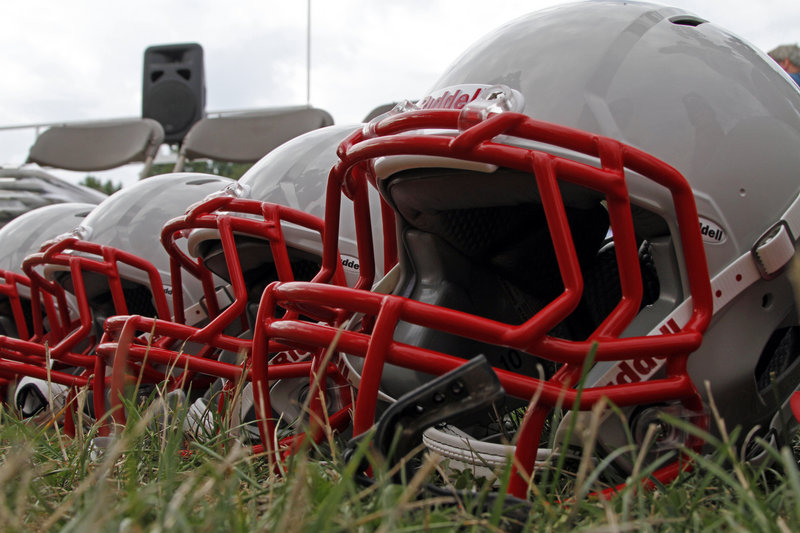When Maine’s high school athletes and coaches begin practicing for fall sports Monday, the focus on concussion-related injuries will be heightened by a new state law.
Every high school soon will be required to develop a concussion management policy for determining when students can return to the playing field and the classroom.
While many schools in Maine already have policies similar to — or stronger than — the law, all school boards will have to follow similar protocols for diagnosing and treating head injuries, and training coaches, athletic directors and other school personnel.
“I see this as a good step,” said Dr. William Heinz, an orthopedist with Orthopaedic Associates in Portland and a leading concussion management specialist. “I wasn’t necessarily in favor of legislation, but this is going to increase awareness of concussions and other head injuries. People have been paying more attention the last couple of years, but now they’re really going to have to pay attention. There are no more cracks to fall through.”
When the law takes effect Jan. 1, Maine will be one of 39 states with laws regarding concussions suffered by youths.
There are still details to be worked out.
Under the law, a student will not be allowed to return to a sport or extracurricular activity until he or she has been cleared by a “licensed health care provider trained in concussion management.”
It’s unclear whether that means only doctors and nurses, or includes athletic trainers and physical therapists who are trained in concussion management.
“That doesn’t appear to be covered anywhere” in the law, said John Morin, an assistant principal and the head football coach at Massabesic High School in Waterboro.
Morin is also a member of the Maine Principals’ Association’s Sports Medicine Committee.
Heinz, who works with the Maine Concussion Management Institute at Colby College in Waterville, one of the nation’s leading concussion research centers, said, “That’s what we’re trying to sort out. We want to keep the language broad enough so that anyone involved in concussion management could clear a student.”
David Connerty-Marin, director of communications for the Maine Department of Education, said a concussion management task force is “working on the details.” He did not know when decisions will be made.
The law will require that:
• School boards develop policies for concussion management.
• Athletic directors, coaches and other school personnel be trained in concussion identification and management.
• Parents sign consent forms acknowledging that injured students cannot return to the field or classroom until they have been cleared by appropriate health care providers.
The law mirrors many of the requirements that the Maine Principals’ Association and school districts have already imposed.
The principals’ association is in its second year of requiring all high school coaches to get concussion management training. They must watch a 20- to 30-minute training video provided by the National Federation of State High School Associations.
About 70 schools are members of the Maine Concussion Management Institute, which provides the ImPact test, a computerized neurocognitive exam that’s used to determine when a student who has had a concussion can resume physical, or mental, activities.
Student-athletes are tested before they start play — yearly at some schools and less often at others.
Any student who suffers a concussion must take the ImPact test again, and may not resume any activities until the scores match the baseline set by the first test.
Any school that already is giving the ImPact test is “above and beyond what the state wants you to do,” said Jim Leonard, the athletic director at Oceanside High in Rockland.
But Connerty-Marin said the law “has a broader focus” than what the principals’ association and schools have had.
“It covers all students, not just student-athletes,” he said. “A lot of the previous guidance was about returning to athletic activities. This is about returning to all school activities. The law is much more expansive.”
State Rep. Bryan Langley, R-Hancock, who was a co-sponsor of the bill along with Rep. Don Pilon, D-Saco, said it included “a bigger concept of returning to learn. A tremendous amount of attention has been paid to students who get head injuries and ask, ‘When can I get back to the game?’ There hasn’t been a focus on the student who is ready to learn and get back to the classroom.”
Heinz said the law is about “a return to function, not just a return to play. The question shouldn’t be if you can get back into the game, but when can you get back to the classroom and a normal life? It’s always been about sports; the focus needs to change.”
Leonard likes that shift in focus.
“This isn’t just about practice-time being impacted; it’s school time,” he said. “We’ve had a lot of athletes miss several days of school, in some cases two weeks, because they couldn’t focus on their classes.”
Heinz is concerned that some schools will struggle to fund the program and find personnel who are trained in concussion management. “Some just don’t have the resources,” he said.
Still, he likes the law.
“We’re going in the right direction,” he said. “Everything we can do to increase the awareness of concussions advances our cause.”
Staff Writer Mike Lowe can be contacted at 791-6422 or at:
mlowe@pressherald.com
Twitter: MikeLowePPH
Send questions/comments to the editors.




Success. Please wait for the page to reload. If the page does not reload within 5 seconds, please refresh the page.
Enter your email and password to access comments.
Hi, to comment on stories you must . This profile is in addition to your subscription and website login.
Already have a commenting profile? .
Invalid username/password.
Please check your email to confirm and complete your registration.
Only subscribers are eligible to post comments. Please subscribe or login first for digital access. Here’s why.
Use the form below to reset your password. When you've submitted your account email, we will send an email with a reset code.